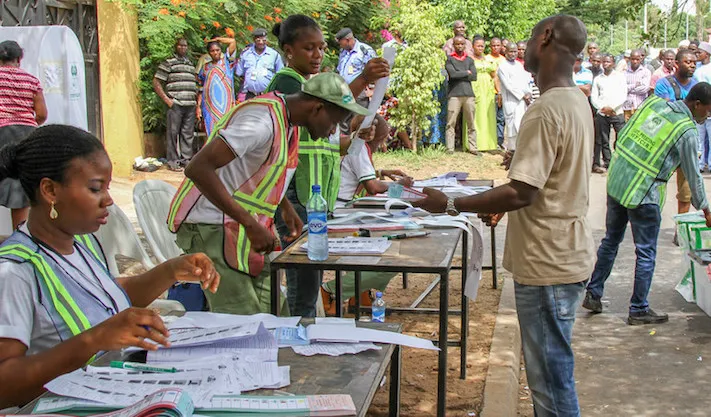The Independent National Electoral Commission (INEC) declared Monday Okpebholo, the All Progressives Congress (APC) candidate, the winner of the recently conducted gubernatorial election in Edo State on Sunday, 22 September 2024.
The election is one of eight off-cycle gubernatorial elections in Nigeria. Since the country’s return to democracy in 1999, gubernatorial elections in most states are typically held simultaneously with general elections every four years. However, eight states conduct their elections separately in what is called ‘off-cycle elections.’
Off-cycle elections in Nigeria are primarily driven by various factors, including electoral disputes and court rulings that annul elections or mandate reruns, unforeseen political crises such as candidate deaths, and constitutional challenges related to irregularities in the electoral process.
These factors collectively necessitate adjustments to the electoral timetable, resulting in the scheduling of off-cycle elections. In essence, off-cycle elections are those held outside the general election schedule.
According to Section 180(2) of the Nigerian Constitution, a governor must vacate office four years after taking the oath of office. Therefore, when unforeseen circumstances alter the election timetable in a particular state, off-cycle elections become necessary to ensure compliance with this constitutional requirement.
In this article, Tribune Online examines the eight states in Nigeria where off-cycle gubernatorial elections are currently being held.
1. Anambra State
The trend of off-cycle elections in Nigeria since the return to democracy in 1999 can be traced back to a political and legal conflict in Anambra State in 2003. On 26 May 2003, Chris Ngige of the Peoples Democratic Party (PDP) was inaugurated as the state’s new governor. However, he was removed from office in March 2006 after Peter Obi of the All Progressives Grand Alliance (APGA) petitioned the tribunal to contest the result that initially declared Ngige the winner. The tribunal, which lasted for two years, eventually annulled the election. Consequently, Obi was sworn in as the new governor in 2006, altering the state’s election schedule and resulting in off-cycle polls every four years in Anambra State.
2. Bayelsa State
Bayelsa’s electoral cycle changed after the controversial 2007 gubernatorial election, in which Timipre Sylva of the PDP was declared the winner. However, a court ruling in 2008 annulled the election on grounds of electoral malpractice after the Action Congress of Nigeria (ACN) candidate, Ebitimi Amgbare, challenged the outcome at the tribunal.
This led to a rerun, which Sylva eventually won again. However, the new election schedule was no longer aligned with the national electoral calendar. As a result, Bayelsa has remained in the off-cycle category, with gubernatorial elections now held separately from general elections.
3. Edo State
Edo State’s election timeline shifted in 2008 following a dramatic legal battle over the 2007 governorship election. Adams Oshiomhole, the Action Congress (AC) candidate, contested the results, alleging widespread rigging in favour of the PDP candidate, Oserheimen Osunbor.
The Election Petition Tribunal in March 2008, and later the Court of Appeal, ruled in Oshiomhole’s favour, nullifying Osunbor’s victory and declaring Oshiomhole the winner of the 2007 election on 11 November 2008. This ruling reset the state’s electoral calendar, resulting in separate election cycles for Edo State.
4. Ekiti State
In Ekiti, a court ruling in 2010 altered the state’s election calendar. The 2007 election, initially won by PDP’s Olusegun Oni, was contested by Kayode Fayemi of the Action Congress of Nigeria (ACN). After three years of legal battles, the Court of Appeal nullified Oni’s election victory and declared Fayemi the rightful winner. Fayemi was sworn in on 16 October 2010, and since then, Ekiti’s gubernatorial elections have been conducted outside the regular election cycle.
5. Kogi State
On 14 April 2007, Kogi State held its gubernatorial election, in which Ibrahim Idris of the PDP was declared the winner. Following the announcement of the results, Abubakar Audu of the All Nigeria Peoples Party (ANPP) challenged the outcome, claiming that his name had been improperly removed from the candidate list. He pursued the case through the tribunal and ultimately to the Court of Appeal. Although the election was annulled, prompting a new election, Idris emerged victorious again. He was re-elected as Governor of Kogi State on 29 March 2008.
6. Ondo State
In Ondo State, the off-cycle election schedule resulted from a 2009 ruling by the Court of Appeal that nullified the victory of then-Governor Olusegun Agagu of the PDP in the 2007 election. Agagu’s main opponent, Olusegun Mimiko of the Labour Party, contested the results, alleging widespread electoral fraud. After the court ruled in Mimiko’s favour, he was declared governor and sworn in on 24 February 2009, resetting the state’s election calendar.
7. Osun State
Osun State’s off-cycle election status is the result of a court ruling in 2010, which declared that Rauf Aregbesola of the ACN had won the 2007 governorship election, not the PDP’s Olagunsoye Oyinlola, who had been in office since the disputed election. After three years of legal proceedings, the Court of Appeal declared Aregbesola the winner, leading to his swearing-in on 27 November 2010. This legal battle shifted the electoral timeline for Osun State, resulting in its current off-cycle status.
8. Imo State
The latest disruption in this cycle occurred after the 2019 elections when the Supreme Court annulled the results in Imo State, which had initially declared Emeka Ihedioha of the PDP as the winner. Subsequently, Hope Uzodimma of the APC was declared the winner on 14 January 2020. This development altered the election cycle in Imo State.
READ ALSO FROM NIGERIAN TRIBUNE




